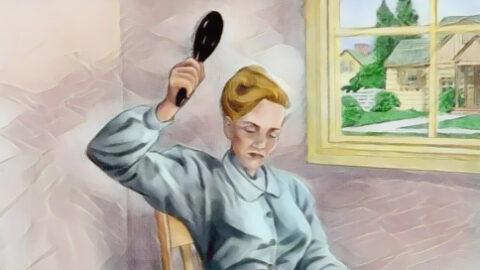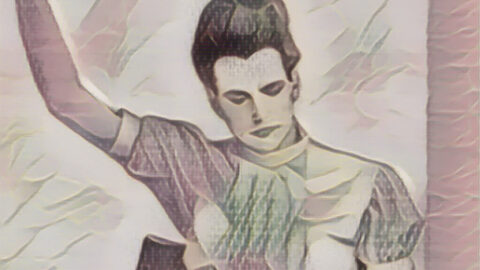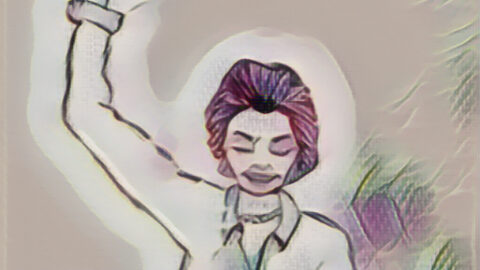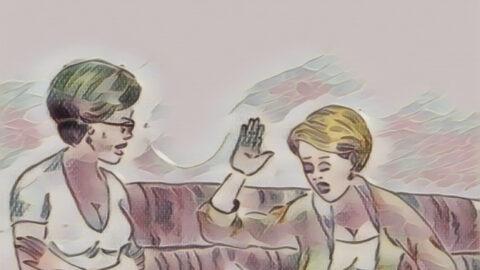I was born into a world of contrasts—a world where my mother, Dorothy, with her gentle hands and kind eyes, endeavoured to shield me from the harsher realities of life. My father, an Englishman whom I never met, existed only as a faint presence in family tales. Our home was modest, filled with the aroma of Sunday stew and the faintest trace of incense from Dorothy’s prayers. She worked diligently, her laughter ringing through our small flat when she was well, her arms always open for an embrace. (pause) Yet, when illness crept in, it stole her strength and, in time, my sense of security. The day she was taken to hospital, I recall the peculiar taste of fear, the sensation that the world had shifted, and the social worker’s voice, distant and muffled, as though I were submerged beneath water.
The care system was a world entirely unlike my own. The Smiths, my first foster family, wore their faith with great pride, their home filled with the scent of polish and the steady ticking of a grandfather clock. They referred to themselves as ‘good Christians,’ but their kindness was brittle, always accompanied by reminders of my supposed good fortune. “You are fortunate to be here,” Mrs. Smith would say, her lips pursed, her eyes never quite meeting mine. They had been informed of my previous mischief—petty theft, committed before Dorothy’s illness—and they never allowed me to forget it. Each Sunday, as we filed into church, the air thick with perfume and starch, I felt the weight of their judgment pressing upon me. The sermons on sin and redemption seemed directed at me alone, and I would sit in the pew, hands tightly clasped, wishing I could vanish.
Their constant reminders to be ‘grateful’ wore away at me. I wished to protest that it was not my fault Dorothy had fallen ill, that I had not wished for any of this. Instead, I kept my head bowed, my frustration simmering quietly, my only solace the memory of my mother’s gentle lullabies.
My time in care became a blur of police cars and stern lectures, of being escorted home with my head lowered and my cheeks burning with embarrassment. The Smiths believed in discipline—firm, unyielding, and public. I learned to brace myself for the sting of a smacked bottom, the humiliation of being reprimanded before strangers. Yet, after a year, something changed. Perhaps I wore them down, or perhaps they simply grew weary of me. In any case, I was sent to live with my uncle, Arthur—Dorothy’s stepbrother—and his companion, Margaret.
Arthur was a man of few words, his face lined by years of night shifts and disappointment. He took me in for the allowance, and I was well aware of it. There was no warmth in his greeting, merely a curt nod and a list of rules. The flat was cramped, the air always tinged with the smell of fried food and stale tobacco. Margaret, his companion, was younger, her hair always perfectly arranged, her nails painted a glossy red. She moved through the flat with a certain restlessness, her eyes darting away from mine whenever we met. I could sense her discomfort, the way she recoiled if our hands brushed, the way she avoided being seen with me in public. My appearance marked me as different, and in her world, different was something to be concealed.
Days blurred into one another, the silence between us growing ever heavier. I spent hours alone in my small bedroom, the wallpaper peeling at the corners, the mattress lumpy and cold. Occasionally, I would press my ear to the door, listening to Margaret’s laughter as she spoke on the telephone, her voice light and carefree—so unlike the clipped tone she reserved for me. I longed for connection, for someone to notice me, to care. But for the most part, I felt invisible, a burden to be tolerated.
Old habits returned, almost without my noticing. Shoplifting became a means to fill the emptiness, a small act of rebellion against a world that seemed determined to keep me in my place. I cannot recall precisely what I took that day—perhaps a lipstick, a cheap bracelet, something bright and pretty to call my own. The shop was warm and crowded, the air thick with the scent of perfume and new garments. My heart pounded as I slipped the item into my pocket, my fingers trembling. But I was not quick enough. A firm hand grasped my shoulder, and suddenly I was being led to the back office, my cheeks burning with shame and fear.
The security guard, Mr. Evans, was a large man with a booming voice and a stern countenance. He towered over me, his words sharp and cold. “You require a proper lesson,” he said, his eyes narrowing. “If you were my child, you would be very sorry indeed.” I attempted to meet his gaze, but my eyes kept darting to the door, hoping for escape. My hands shook as he searched my pockets, his touch brisk and impersonal. I felt small, exposed, and utterly alone.
When Margaret arrived, her face was a mask of irritation and embarrassment. She scarcely looked at me as Mr. Evans explained what had occurred, his voice heavy with disapproval. Margaret apologised to him, her words clipped and insincere, then seized my arm with a grip that left bruises. I could feel her anger radiating, sharp and unmistakable.
Mr. Evans informed us that the police would not be summoned, as a legal guardian was present. He placed a form before me, and I signed it with a trembling hand, my name scrawled in shaky letters. I was officially barred from the shop, my shame now recorded in ink.
As we departed, Margaret turned to Mr. Evans, her voice cold and triumphant. “Do not worry, she will receive a proper punishment when we return home.” The guard nodded, satisfied, and I felt a fresh wave of dread wash over me.
The walk home was silent, the only sound the click of Margaret’s heels on the pavement and the distant hum of traffic. The sky was overcast, the air heavy with the promise of rain. Upon reaching the flat, the door slammed behind us, the sound echoing through the empty rooms. The house felt colder than ever, the walls closing in around me. Margaret wasted no time. She led me to my bedroom, her grip unyielding, her face set in a hard, unforgiving line. (short pause) The door snapped shut, and I was alone with her anger. She did not speak—her silence was more frightening than any words. She pulled me over her lap, her movements mechanical, and I could feel my heart pounding, my breath coming in short, panicked gasps. (pause) The first smack landed with a sharp crack, the pain immediate. Each slap stung, the sound echoing in the small room, each one a reminder of my powerlessness. I tried to hold back my tears, but they came nonetheless, hot and fast, blurring my vision. (pause) When she switched to the belt, the pain deepened—more biting, leaving angry red welts that throbbed long after the leather had left my skin. I bit my lip, trying not to cry out, but a few sobs escaped, raw and desperate. (pause) The ordeal felt endless, though it was likely only a few minutes. By the end, I was left trembling, my body aching, my pride in tatters. I curled up on my bed, my face buried in the pillow, the taste of salt and shame on my lips. (pause) Later, when Arthur returned, Margaret recounted everything, her voice cold and matter-of-fact. He did not hesitate. His method was rougher, less controlled, his anger evident in every blow. I was too exhausted to resist, too numb to care. I simply lay there, enduring it, waiting for it to end. (pause) For days afterwards, every movement was a reminder of that Sunday lesson—a lesson delivered with a heavy hand and a cold heart, in a house that never felt like home. The bruises faded, but the ache lingered, a silent testament to the loneliness and longing that shaped my childhood.
































